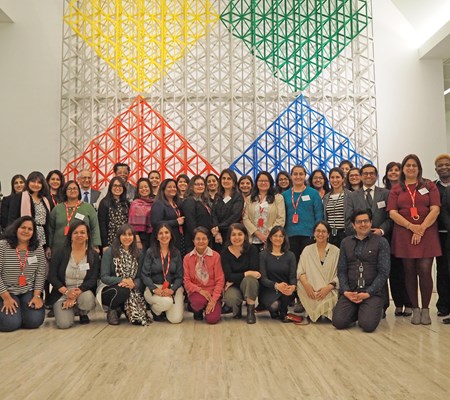Towards New Beginnings – A Collaborative Workshop Exploring Creative Ideas in Early Childhood Education

“The way in which children are educated in their earliest years is a key which can unlock the doors of opportunity for the rest of their lives.”
His Highness the Aga Khan, Commemoration of the 25th Anniversary of the Madrasa Programme, Mombasa, Kenya, 14 August 2007
His Highness the Aga Khan has emphasised Early Childhood Development (ECD) as a significant area of priority for the global Ismaili community. To address this priority, educational institutions in the community and several Aga Khan Development Network (AKDN) agencies are engaged in a range of ECD initiatives, aimed at increasing access to early childhood programmes. These endeavours reflect a multi-input, inter-institutional approach, focusing on the educational and developmental goals that are critical to attain in the early childhood phase.
To support and contribute to the early learning goals of the Ismaili community globally, The Institute of Ismaili Studies (IIS) has developed a draft early learning integrated curriculum framework for curriculum planners. It proposes a curriculum that takes into account the significant domains of child development in the formative years, including a child’s religious, moral and cultural education. Approached from a broadly humanistic perspective, the framework is organised around seven interlinked developmental and learning domains, facilitating the bridging of religious and secular education. The integrated framework addresses the needs of children from birth to pre-school.
To receive and discuss input on the framework, ECD coordinators from the Ismaili Councils and the Ismaili Tariqah and Religious Education Boards (ITREB), along with representatives from AKDN agencies, were invited to a workshop organised by the IIS at the Aga Khan Centre in London in early December 2019. The workshop format was based on a combination of presentations and group discussions which were participant-led. Representations from sixteen country-contexts worldwide generated rich discussions on the enhancement of the integrated framework which was being proposed. Participants also engaged with a wide set of topics on ECD, such as special needs, digital technology, local resources, parental engagement, context-specific issues and needs, and best practices related to early learning. Reflecting on her learnings from the workshop, Nuhad Pirani, ITREB USA ECD Board Member, remarked:
“The global Early Childhood Development workshop enhanced my understanding of how a multi-faceted and multi-institutional approach can contribute to creating a ‘wholistic child’. This conference offered me a universal perspective of how ECD is implemented around the globe. I was amazed to learn how the same early childhood education curriculum objectives can very easily be achieved with no costs or low costs.”
The ECD strategy and programmatic initiatives of Aga Khan Education Services (AKES) and Aga Khan Foundation (AKF) were communicated to participants by Nimet Rener, Director of AKES, and Nafisa Shekhova, Global Lead of Education AKF. The participants were informed of the need for a cross-agency approach to the ECD endeavour, given the multiple dimensions of child growth which need to be addressed.
Dr Almina Pardhan, Assistant Professor and Coordinator of Early Childhood Education Development Programmes at the Aga Khan University’s Institute for Educational Development, explained the importance of ECD as an investment for the future of the Ismaili community:
“These conversations are very important for repositioning and ensuring the success of future generations … I feel blessed and grateful, and have found it really inspiring to be part of this collaborative process. Such opportunities to exchange ideas, knowledge and experiences are significant.”
The earliest years are viewed as essential in laying foundations that support children’s learning, development, health and well-being in life. Within this framework of wholistic development, young Ismaili children are introduced to simple precepts of faith and ethics as part of their dini education, approached in an interrelated manner. Children are also inducted into the principle of pluralism from an early age so that they become aware and accepting of the rich diversity of people and cultures around them.
It is hoped that the insights and ideas generated at the workshop will equip participants with the tools to implement appropriate ECD strategies and programmes in their country-specific contexts.
